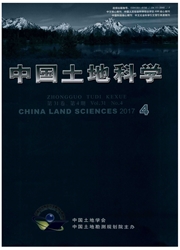

 中文摘要:
中文摘要:
研究目的:揭示农民参与农地整理项目的行为决策机理,为今后制定激励农民参与的相关政策提供科学依据。研究方法:基于成本收益理论视角构建农民参与农地整理项目行为决策模型,采用农户问卷调查数据进行实证检验。研究结果:农民参与行为决策由参与行为预期收益与成本所决定;农民对农地整理项目的认知、农民参与对项目工程质量影响的判断、周围村民意见、是否村干部、政府对农民参与所持的态度、项目信息公开透明程度、农民年龄等对农民参与行为决策影响显著。研究结论:在今后农地整理项目开展中要加大农地整理政策的宣传力度,支持和引导项目区农民积极参与项目的各项决策,建立健全公众参与机制,加强农村社区“和谐”、“民主参与”等社会文化的建设。
 英文摘要:
英文摘要:
The purpose of this paper is to reveal the behavioral decision-making mechanism of the farmers regarding the participation in farmland consolidation project, and to provide a scientific basis for formulating relevant policy to encourage farmers’ participation in farmland consolidation project. This paper takes advantage of cost-benefit theory perspective to build behavior decision model of farmers involved in land consolidation project, and employ the survey data for empirical test. The empirical results show that participation decision-making behaviors of farmers are decided on the size of prospective earnings and cost of participative behavior. The factors such as farmers’ cognition on land consolidation project, farmers’ judgment of participating that improves the quality of project engineering facilities, the opinion of villagers around, the identity of village cadres, the attitude of the government on farmers’ participation, the publicity and transparency degree of project information, farmers’ age and family contracted farmland area together have significant impacts on farmers’ participation decisions. Among them, farmers’ cognition on land consolidation project variable is the important factor that affects farmers’ participation behavior;the variable of identity of village cadres is the key factor that affects farmers’ participation behavior. The paper concludes that some measures may be taken in land consolidation project, such as to strengthen the land consolidation policy propaganda, support and guide farmers in project area to actively participate in the decision of project, establish the perfect public participation mechanism, and strengthen constructing the social culture in rural community, e.g.,“harmony”, and“democratic participation”.
 同期刊论文项目
同期刊论文项目
 同项目期刊论文
同项目期刊论文
 期刊信息
期刊信息
